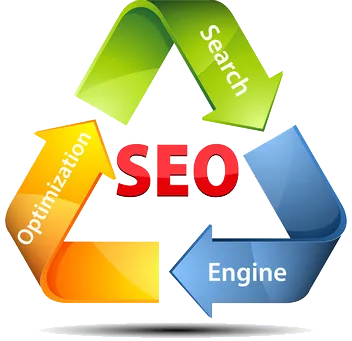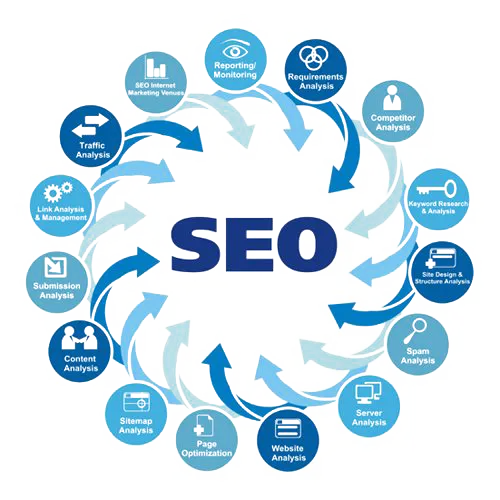Holly Hill SEO
In today's hyper-competitive business world, you need stay relevant online to compete with both local companies and large national chains. SEO is the most cost effective way to not only capture local clients but to also compete with larger, national companies with much larger digital marketing budgets.
Consumers have become extremely reliant on search engines. They use Google as their one-stop place to do research and purchase many of the services that your company could provide to them. Problem is, they cannot find you. If you are not being seen on Page 1, in rankings, who do you think is going to get that job or win that client's business? Will it be your business on page 20 or the business that is dominating Page 1? Let Choice Marketing and Consulting help you dominate Page1 without breaking the bank !

What Is Search Engine Optimization (SEO)?
SEO, or Search Engine Optimization, is a way to make your business stand out online. Imagine a busy street filled with shops; SEO is like a bright, eye-catching sign that entices customers to that store.
In the digital world, customers use search engines like Google to find what they need. If your business ranks high in their search results, you're more likely to be noticed. SEO helps your website to get a higher position in these rank results. It involves using relevant keywords, ensuring your site loads quickly, and is easy to navigate. The ease of use of a website also plays a role. Google loves user-friendly websites.
For local business owners, this process can put their business on the map, both literally and digitally. When someone in your area searches for products or services that you offer, effective SEO and digital marketing strategies can ensure your business is one of the first they see. So, Search Engine Optimization helps you reach more local customers, increase your businesses visibility, and ultimately, boost your sales. It's like a digital introduction, connecting your business with the people who are looking for what you offer.
What Is Search Engine Optimization (SEO)?
SEO, or Search Engine Optimization, is a way to make your business stand out online. Imagine a busy street filled with shops; SEO is like a bright, eye-catching sign that entices customers to that store.
In the digital world, customers use search engines like Google to find what they need. If your business ranks high in their search results, you're more likely to be noticed. SEO helps your website to get a higher position in these rank results. It involves using relevant keywords, ensuring your site loads quickly, and is easy to navigate. The ease of use of a website also plays a role. Google loves user-friendly websites.
For local business owners, this process can put their business on the map, both literally and digitally. When someone in your area searches for products or services that you offer, effective SEO and digital marketing strategies can ensure your business is one of the first they see. So, Search Engine Optimization helps you reach more local customers, increase your businesses visibility, and ultimately, boost your sales. It's like a digital introduction, connecting your business with the people who are looking for what you offer.
Choice Marketing and Consulting Specializes In:
SEO versus Paid Ads for local Florida Businesses
Cost Control and Reach
Here is a typical and astounding comparison. Two Florida Roofing companies illustrate the difference in approach and results. ABC Roofing opts for a traditional digital marketing strategy, investing a hefty $30,000 per month on ads, resulting in approximately 60 appointments. The 60 appointments result in 10 booked jobs at an average of $22,000 each. In a 3 month span ABC roofing generates $396,000 in revenue at a cost of $90,000. Acme Roofing, meanwhile, takes a different route. With a sharp focus on a robust SEO strategy, Acme Roofing spends $6,000 a month on the SEO plan. Acme Roofing starts seeing results in month 4. The results? Starting in month 4 a staggering 120 bookings per month - twice the result of ABC Roofing, at a fraction of the cost. Out of the 120 appointments they land 20 jobs (this would be much higher based on being sought out versus trying to be found but for this analogy we will keep the ratio the same). Each job brings in the same $22,000. So in just new business generated over the same 3 months it looks like ABC Roofing is ahead, right? Well no Acme Roofing did far better in a few areas. $440,000 in revenue versus $18,000 in spent dollars. ABC Roofing netted $306,000 and did not really gain any traction in creating a footprint as the go-to roofer in their area but they did make some money. Acme Roofing netted $422,000 in the same time period. Looking at the longer term, SEO's value becomes even more apparent. Unlike ad campaigns, which cease to bring traffic as soon as the budget runs out, SEO builds a lasting digital presence. Websites that rank highly on search engine results due to well-implemented SEO strategies continue to attract organic traffic long after initial optimization efforts. The result is sustained exposure and reach that isn't tied to an ongoing ad spend. In addition, SEO reaches not only a wider audience but also a more targeted one. This is because search engine users are actively looking for the services or products you offer, which makes them more likely to convert into customers. SEO, in essence, helps businesses to become more visible to potential customers who are already in need of their services. This is an advantage that traditional digital marketing strategies simply can't match for the cost.
Conversion Quality and Scalability
SEO is not just about improving visibility and rankings; it also offers numerous indirect benefits that significantly bolster business performance. For starters, a solid SEO strategy enhances brand recognition and trust. When a website consistently appears in search results, it becomes more familiar and trustworthy to users. Brand recognition and trust are vital components of customer retention and loyalty, making SEO a valuable tool in any business's digital marketing arsenal. In addition to brand recognition, SEO also improves the user experience on your website. Search engines favor sites that are user-friendly, meaning they load quickly, are easy to navigate, and contain relevant, well-structured content. By optimizing for these factors, you not only increase your chances of ranking higher on search engine results pages, but you also provide a more enjoyable experience for your visitors, increasing the likelihood of them becoming customers and returning in the future. Moreover, SEO also contributes to the overall performance of your business. Metrics like increased traffic, lower bounce rates, and higher conversion rates all indicate a successful SEO strategy and contribute directly to your bottom line. Furthermore, by providing detailed metrics, SEO allows you to understand your audience better, tailor your offerings to their needs and preferences, and make data-driven decisions about your business strategy, leading to improved performance and profitability in the long term.
It's worth noting that the benefits of SEO extend beyond your website. The insights you gain from your SEO efforts can inform your other marketing strategies, providing a more holistic understanding of your industry, competition, and customers. By integrating SEO with your overall digital marketing plan, you can create a synergistic effect that amplifies the reach and effectiveness of all your marketing efforts. In conclusion, while both SEO and digital advertising have their merits, the value of SEO is clear. It offers a cost-effective, scalable solution with high-quality conversions, crucial brand recognition, and numerous indirect benefits that strengthen overall business performance. In the evolving digital landscape, a well-implemented SEO strategy is not just an option—it's a necessity.
Operating on a set budget each month simplifies the process of strategizing for business expansion. With SEO, the costs associated with expansion are significantly less than those incurred through other forms of paid advertising. Unlike traditional advertising methods where the costs increase linearly with the scope of the campaign, SEO allows for greater flexibility. Once established, an effective SEO strategy can continue to yield results over an extended period without requiring a proportional increase in investment. This stands as a stark contrast to paid advertising campaigns, where expansion typically means a direct increase in cost. Consequently, SEO becomes an incredibly valuable tool for businesses seeking to expand their reach while maintaining control over their marketing expenditure.
Facts that you need to understand about Search Engines and SEO
Q. What is the role of a search engine?
A. The primary role of a search engine is to facilitate quick and efficient access to relevant information. By indexing billions of web pages, search engines create a vast database or 'index' of the internet. This compilation is keyword-based, enabling users to search for specific terms and retrieve pages containing those terms.
When a user enters a search query, the search engine gets to work. It sifts through its massive index to find the most pertinent information. The engine uses complex algorithms that consider various factors such as the frequency and location of keywords on a webpage, the age of the page, and the reliability and relevance of its links. Moreover, these algorithms are designed to prioritize websites that provide valuable and relevant content, enhancing the user's experience on the internet. The search engine presents the retrieved information to the user in an ordered list known as search engine results pages (SERPs), ranked on relevance and quality.
Search engines utilize a process known as 'crawling' to gather information about content available on the web. This process involves the use of 'bots' or 'spiders' that move across web pages, following links and collecting details about the pages. These details are then used to build an index. Once a page is in the index, it's in the running to be displayed as a result to relevant queries. Search engines analyze pages in the index, taking into account hundreds of ranking factors or signals, to determine the order pages should appear in the search results for a given query. The search algorithms are designed to surface relevant, authoritative pages and provide users with an efficient search experience. These algorithms take into account many factors, including the words of your query, relevance and usability of pages, expertise of sources, and your location and settings. This highlights the importance of SEO in digital marketing. A well-planned SEO strategy involves creating high-quality content with integrated, well-researched keywords, maintaining a user-friendly website, and securing high-quality inbound links. With a strong SEO strategy, businesses can effectively reach their target audience, boost online visibility, and cultivate a strong online presence.
SEO promotes relevance in two significant ways: through content optimization and link building. Content optimization is all about making your website's content as relevant as possible to what potential visitors are searching for. This is achieved by identifying target keywords and phrases that users commonly search for, and incorporating them in a seamless and meaningful way within the website's content. By doing so, search engines can easily identify the relevance of your content to a given search query, thereby improving the chance of your website appearing in the search results. On the other hand, link building involves establishing connections with other relevant and authoritative websites that will link back to your website. These backlinks are critical in search engine algorithms as they are viewed as a vote of confidence from other websites. The more high-quality, relevant backlinks a website has, the more relevant and authoritative it is perceived by search engines.
At the heart of every search engine lies the search query - the user's request for information. When a user inputs a search term or phrase, the search engine matches this query against its vast index of webpages. In a fraction of a second, the search engine algorithm assesses each of these indexed pages, determining how well they match the search query and how valuable they are likely to be to the user. Search engine algorithms are complex and constantly evolving, but they all follow the same basic principles. They scan the text of a webpage, looking for keywords that match the user's search query. They evaluate how frequently and where those keywords appear on the page. They also consider the age of the webpage, the number and quality of other sites that link to it, and various other factors. What sets one search engine apart from another is how each weights the importance of these various factors. Some search engines might give more weight to the number of incoming links a webpage has, while others might prioritize the presence of keywords in the webpage's meta tags. The challenge for digital marketers is to understand these differences and optimize their content accordingly. Websites optimization for search engines involves both on-page and off-page strategies. On-page optimization includes ensuring that a website's meta tags, title tags, internal linking structure, and content are all optimized for target keywords. Off-page optimization, on the other hand, involves strategies such as link building and social media marketing. In the realm of digital marketing, content is king. High-quality, optimized content attracts search engine bots and engages human readers. This content must be updated regularly, as search engines prefer fresh content over stale or outdated material. The content must also be valuable, offering useful information and solving problems for readers. SEO is a critical component of digital marketing strategy. A well-executed SEO strategy can help a business increase its online visibility, drive more traffic to its website, and ultimately generate more leads or sales. It's not just about getting visitors to a site, but about getting the right kind of visitors - those who are most likely to become customers.
SEO FAQ'S
Frequently Asked Questions About SEO (Search Engine Optimization)
Q: Isn't SEO slow?
A: Not at all. Google is all about trust. SEO, if handled correctly, is all about telling Google about your business and website. Showing how your reach has increased naturally. The more information that Google has about a business the more that website will gain trust. This means that when a relevant keyword is searched for, your "trusted" site is going to indexed and shown. The idea of SEO being slow is one that came about because Search Engine Optimization is not flashy or fun. Make no mistake, when these strategies are properly put in place, there is NOTHING slow about your revenue growth.
Q: How much time will this add to my schedule?
A: Simple answer, little to none. Choice Marketing and Consulting will handle all the tedious work that no one wants to do but needs to do. Our staff will handle every keystroke and link that is necessary to turbo charge your revenue.
Q: Will this affect the ads that I am already paying for?
A: NO. If anything, you will hear your phone ringing more, your email buzzing more, and text messages jumping into your inbox.
Q: How long until I see results?
A: There are many factors in play but, in most cases, you will see yourself ranking higher in a few weeks to one month.
Q: Do I have to sign a long term contract?
A: Absolutely not. The Search Engine Optimization management we provide is month to month. Our goal is to earn your business over and over again. This keeps us on our "A Game" nonstop.
Q: How much is this going to cost?
A: Great question. Until we do a full analysis and understand your goals, we cannot fully evaluate the scope of work that will be needed. Feel free to click below for a risk-free, no obligation analysis. Here at Choice Marketing and Consulting, we understand every business and industry is different. When developing a SEO Management Strategy, the location of the business, the saturation with other like local businesses, and the target consumer demographics are all different. All of these factors, and more, have to be evaluated. There is no point in implementing a SEO strategy that will not benefit your business goals.




